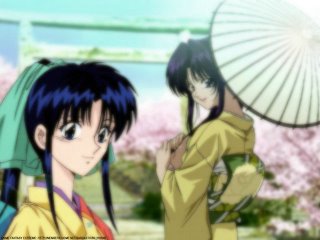
I was planning to use Mouri Ran (毛利蘭) picture from Detective Conan (名探偵コナン), however it is hard to find her picture from net. Thus, I used Kamiya Kaoru (神谷かおる) from Rurouni Kenshin (るろうに検心) here...
(Picture from: http://sobakasu.free.fr/)
Picture upload by Picasa
If you’re not a native English speaker, I think you’ve ever been in a point on your English learning when you find that definite and indefinite articles (‘the’ and ‘a’) are extremely hard to comprehend, that it makes you think that unless you were reborn as a native, you will never understand them (honestly, sometimes I still feel so :-) ). Or, if you ever happen to learn German, you’ll know that its definite articles not only change according to gender, but also to the noun role in a sentence (nominative, accusative, dative, genitive), and that they could fill up your nightmares, specially before your German test :-). Well, every language has their difficult part, and when I was happy to find that there is no such articles in Japanese when I started to learn it, I should’ve known that the ‘phantasm’ that would haunt me through the rest of my life like the crawling creature in “The Ring” had yet to come (Okay, I’m exaggerating here... :-) ).
Well, those ‘horrors’ finally came to me, and they are called particles. They are short, most of them are only expressed by a single kana, but they play an important role in Japanese. Using the wrong particle in a particular sentence doesn’t make the sentences wrong sometimes; but worse, it makes the sentence convey a message totally different from what you intent to say. I give the example below. (I got this from Makii. We keep a shared diary where I write in Japanese and she write in English, and then we check each other’s entries and write our correction there. I made so many mistakes related to the particles that now the diary is full of particles usage explanations from Makii. The good point is, I think our diary is qualified enough now to be used as a Japanese Particles Guidebook :-) )
Here's the example:
Let’s say that you met a Japanese girl with shining eyes, and you’d go to the center of the universe just to say that out loud (世界の中心で、「your eyes are beautiful!」を叫ぶ <-- if you know the movie you’ll understand this :-) ). Anyway, you want to look cool while doing it, and you think by saying it in Japanese will do the trick. So you type the sentence in your favorite automatic English-Japanese translator and whisper the sentence that the translator gives you to the girl...
Well, at this point, I could only hope that either the girl realizes that you’re not native Japanese, or she has a good sense of humor to think that you were just joking when saying it. Most of automatic translators would translate the sentence into 「あなたの目は美しいです」 (Anata no me wa utsukushii desu), or if you want it in a more colloquial way: 「目は可愛いです」 (Me wa kawaii desu) --> your eyes are cute. (In fact, I tried 3 translators and all of them gave me the same results). The sentences are grammatically correct, but the girl will reckon you saying that only her eyes are beautiful (and other parts are not). The grammatically and ‘spiritually’ correct translation would be 「あなたの目が美しいです」 (Anata no me ga utsukushii desu) or 「目が可愛いです」 (Me ga kawaii desu). You can see that the differences are only in wa (は) and ga (が), and these are the horrors, oops, the particles that I mean.
The problem will also arise if you want to say “You look great today!”. You shouldn’t say 「今日君は素敵だよ!」 (Kyou kimi wa suteki da yo!), but 「今日君が素敵だよ!」 (Kyou kimi ga suteki da yo!). Actually, there’s another particle for this that will give a better effect on what you intent to say: mo (も). If you say 「今日君も素敵だよ!」 (Kyou kimi mo suteki da yo!), it would translate as “You also look great today! (as great as usual)”.
To sum up, here’s the list of “you look great today!” translation:
「今日君も素敵だよ!」 (Kyou kimi mo suteki da yo!) (highly recommended!)
「今日君が素敵だよ!」 (Kyou kimi ga suteki da yo!) (okay)
「今日君は素敵だよ!」 (Kyou kimi wa suteki da yo!) (never ever say this unless you really really know what you're saying).
Well, either way, I hope the girl understood what you really wanted to say... (even if what you actually want to say was "you (only) look great today!" :-) )





